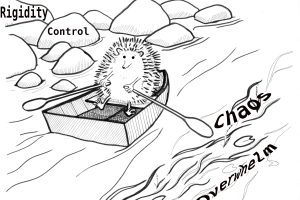“I don’t have students who’ve been through violence, the problem I have is students who aren’t motivated. If they can’t be bothered to show up on time each day, to pay attention, do the work I set, why should I go out of my way to help them? Fortunately, they’re not a problem for long, they soon drop out, and then I can concentrate on teaching the ones who want to learn.”
I can hear him still, this adult educator I met years ago in a workshop I was leading in Canada’s north. I have heard such complaints many times since then. They’re not his exact words, I can’t recall my own precisely either, but I remember his certainty that it was better that those students quit, and I know I worried about what they would learn from dropping out—again.
I know I kept looking for ways to convince him that all those behaviours that told him so certainly that those students weren’t motivated, fit into another story too—a story about the impact of violence on learning. They may look like they (or we) don’t care, but perhaps they care so much that trying again is almost unbearable. I wanted to help this instructor, and so many educators, see an altered outcome might be possible if we approach those students differently. I have seen the dramatic difference that can occur ‘just’ from naming truths!
That day I think I described how self-doubt can rob a person of the capacity to get out of the house on time, leaving them, or us, feeling “what’s the point” “why bother” “I’ll fail again this time, just like before!” I learned that from students whose absence was frustrating me, when I finally asked them why they weren’t in class each day and the stories spilled out. I learned it too from the drumming course I took, when I was often late. I felt so bad about my failure to master the drumming patterns, that even with plenty of learning success behind me in other areas, I found I just couldn’t get out of the house on time, missed when I was just a little sick with a cold, got farther behind, until I quit, promising myself I would return some day. Many years ago now, but I still haven’t returned! My undertaking wasn’t vital, I’ve found other ways to play, but I remember those feelings clearly.
When the course is the gateway to a job, or some other important change, then the stakes are far higher. I feared that this instructor’s adult students might find it too hard to counter their negative voices, to keep showing up, only to feel bad again and again, unless they were met with rich relationships, clear encouragement, a teacher with faith in their capacity, to help them keep going, until they dared to believe in themselves. Without that support, the voices of doubt and despair are often too strong, and the pattern gets clearer: late, missing, forgetting work, not speaking up, not asking for help. It might look like “not trying,” or “not caring,” but I’ve seen how much invisible hard work it can take to withstand the old stories! Even the student themselves can believe they are lazy or unmotivated when they can find no other explanation!
Perhaps a student does, with mighty effort, get to class, even on-time, in spite of the slowing effect of anxiety, the drag of doubt, alongside the myriad practical demand: the kids to get up, the breakfast to prepare, the lunches to pack, the youngsters to drop at daycare. But what will they meet after that super-human effort to show up? Will there be a warm welcome even when they are late, reminders that it is always hard at the start of a course, that it gets easier?
Will they be told it’s ok if they miss instructions, get confused, that no question is stupid, that if they find it too hard to ask in front of the group, they can ask after class? Will the teacher make it clear to everyone that it is normal to blank, to get lost literally and figuratively, or will a certain impatience, a hasty explanation, a quick leap into the content leave some students gasping, unable to get fully present in that classroom, to open to learning? Will they dare to ask questions—even when asked “do you understand”? Will they actually hear such an invitation, or will they be long gone already, only the body left in place, while mind and spirit have already left? Self-protection learnt well in the hardest times, is necessary, it helped us survive violence, but it provides no safety from judgement.
Now, I think we all need to figure out the “real” problem, or perhaps I should say the problem behind the first problem we think we see, otherwise the solutions won’t help! Kate Nonesuch, a wise educator friend of mine, says every adult who signs up for a class is motivated. Perhaps I could have asked that adult educator what drive he thought had led his “unmotivated” students to sign up in the first place, to come to class, if not every day, at least some days; and what he thought had changed for each one when they dropped out?
I still want to insist there is much we can do to create a safer environment for learning, and that moving away from certainties, and turning towards curiosity might make an important difference!
Note: You are Amazing image was generously drawn by Rosalind Penfold, author of Dragonslippers for learningandviolence.net








4 Comments
Leave your reply.